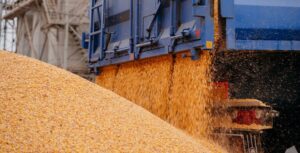
In January 2025, Ukraine exported 5 million tons of agricultural products, which is 9.7% less than the same indicator of the previous month, according to the Ukrainian Agribusiness Club (UCAB).
“For the third month, there has been a downward trend, but this is typical for the winter period in the absence of force majeure,” analysts explained.
Speaking about the structure of exports in January 2025, they noted that the exports of grains decreased by 3% to 3.5 mln tonnes (corn – 72%, wheat – 26%, barley – 2%) compared to December 2024, oilseeds – by 39% to 352 thsd tonnes. tons (soybeans – 63%, rapeseed – 29% and sunflower seeds – 6%), cake after extraction of vegetable oils – by 22% to 406.3 thsd tonnes (sunflower – 67%, soybean – 33%), other agricultural products – by 24% to 329.5 thsd tonnes.
At the same time, the export of vegetable oils increased by 1% compared to December 2024, to 424.4 thsd tonnes (sunflower oil – 89% and soybean oil – 10%).
The analysts noted that the export volumes of grains and vegetable oils remained approximately at the level of the previous month. Oilseeds (-39%) and oilcakes after extraction of vegetable oils (-22%) showed the decline.
“In the current marketing year, the vast majority of agricultural products intended for export have already been exported, in particular, wheat – 64%, corn – 55%. Accordingly, in the coming months, a further slight reduction in export shipments is possible,” UCAB predicts.

In 2024, the Export Credit Agency (ECA) supported 69 exporters by insuring their foreign trade agreements, loans for the execution of such agreements, and investment loans for UAH 1 billion, according to the agency’s website.
Thus, the supported exports amounted to UAH 7.53 billion, and one hryvnia of ECA’s liability brought UAH 7.52 of future export revenue.
ECA’s clients operate in 19 regions of Ukraine, among which the leaders in terms of exports were: Kyiv (UAH 3.8 billion of export revenue), Lviv region (UAH 1.25 billion) and Vinnytsia region (UAH 703 million).
Nine banks are helping exporters, together with the ECA, to safely expand their business geography. Ukrgasbank financed UGB the most – UAH 374.67 million (UAH 2.9 billion of supported exports), Oschadbank – UAH 208 million (UAH 629 million), and FUIB – UAH 131 million of loans (UAH 1.78 billion of supported exports).
The ECA also reports that during the year it introduced new products to protect investors from military risks and concluded the first such agreements, supporting UAH 137.6 million of investments.
The ECA also insured a bank guarantee for the performance of work by a Ukrainian contractor in Poland for the first time.
In 2024, ECA became a full member of the Berne Union, an international organization that brings together export credit agencies and promotes international trade.
“This opens up new opportunities for cooperation with international partners and raising our export risk insurance standards and improving insurance products,” the agency explained.
In cooperation with the World Bank, ECA developed a draft five-year strategy for the company and adopted it, which was one of Ukraine’s commitments to the IMF. The task was completed five months ahead of schedule.
In addition, ECA was the first state-owned company to approve its strategy by a decision of the Supervisory Board in accordance with updated corporate governance standards.
The report also notes that in 2025, the main tasks of the ESA will be, in particular, to expand the possibilities of insuring foreign trade contracts, increase the volume of support for foreign economic contracts, and the amount of investment finance insurance. Another priority will be the launch of a loan insurance compensation program aimed at supporting small and medium-sized businesses. The actual reduction in the cost of insurance will contribute to an increase in the number of exporters who want to receive additional protection for their business, explains ECA. And by addressing the lack of capital, ECA will be able to support more businesses and implement larger projects.

Electricity imports in January 2025 decreased by 63.2% to 159.09 thousand MWh compared to December 2024, while exports increased 9 times to 63.4 thousand MWh, according to the Energy Map portal.
Thus, according to the calculations of the Energoreforma Internet portal, based on these data, electricity imports in January 2025 exceeded exports by 2.5 times.
Most of the electricity was imported in January from Poland – 50.78 thousand MWh (31.92% of the total). This was followed by Slovakia – 42.46 thousand MWh (26.69%), Hungary – 41.2 thousand MWh (25.9%), Romania – 23.38 thousand MWh (14.7%), and Moldova – 1.26 thousand MWh (0.79%).
In terms of exports in January, Moldova ranks first – 27.14 thousand MWh (42.81%) were supplied there. Hungary exported 21.12 thousand MWh (33.31%), Romania – 8.18 thousand MWh (12.9%), Slovakia – 6.27 thousand MWh (9.89%), Poland – 0.68 thousand MWh (1.08%).
As reported, electricity imports in December 2024 increased by 2.7 times compared to November – up to 433.4 thousand MWh, while exports decreased by 6.1 times – to 6.8 thousand MWh.
“In 2024, Ukraine imported 4436.6 thousand MWh of electricity, which was the highest figure for the last 11 years (actual data before 2014 are not publicly available). At the same time, electricity exports reached a historic low of 348.5 thousand MWh,” says the annual review provided to the Energoreforma project by DiXi Group, a Ukrainian energy and climate think tank.

Export revenues of the Ukrainian IT sector last year amounted to $6.45 billion, which is 4.2% less than in 2023 and 12.3% less than in 2022, according to statistics from the National Bank of Ukraine (NBU).
The largest inflows in terms of this year were recorded in the fourth quarter – $1.67 billion, while for the same period in 2023 and 2022, this figure was $1.70 billion and $1.87 billion, respectively.
According to statistics, the United States of America was the most active importer of Ukrainian IT last year, with $2.39 billion worth of goods, although its share in the total volume decreased by 2.6 percentage points (p.p.) to 37.2%.
The second place was taken by the UK, which increased its share by 0.8 p.p. to 8.8% and imported $565 million worth of Ukrainian IT services.
It was followed by Malta, whose share among importers decreased by almost 0.7 percentage points to 7.8%: in 2024, the country purchased $565 million worth of IT services from Ukraine.
The top five countries in terms of consumption of Ukrainian IT exports are Cyprus and Israel, whose shares slightly increased in 2024 to 6.1% and 4.6%, respectively. Cyprus imported $394 million worth of Ukrainian IT, while Israel imported $297 million.

“Nibulon is now one of the three largest grain exporters in Ukraine and has been profitable for two and a half years, with EBITDA of approximately $68 million in 2024, Andriy Vadatursky, owner of one of the largest grain market operators in Ukraine, JV Nibulon LLC, told NV in an interview.
He noted that this figure is slightly lower than the agricultural holding planned due to difficulties in the second half of the year, and added that in a few days he will have the exact figure of financial performance for 2024.
Commenting on the information about the increase in the share of Nibulon’s own fleet in 2024 from 26% to 55%, and the volume of transportation from 278 thousand tons to 404 thousand tons, Vadatursky reminded that the company was built on investments in alternative ways of delivering products, in particular, in water transport. Accordingly, elevators were built on the Dnipro River and the Southern Bug River.
“Now all this is standing still. Kherson is under fire, Mykolaiv is closed. The fleet has nowhere to work. More than 100 ships are blocked. Some elevators, even in the occupied territory, are left without water. The
Kakhovka dam was broken in May 2023. The prospect of returning was taken away from us. I can’t imagine that the river (transportation by the Dnipro) will work for 5-10 years, even after the victory,” he said.
To solve this problem, Nibulon leased vehicles from Scania (Sweden), increased the number of vehicles and, of course, optimized its operations to use its own vehicles as much as possible.
“We have 138 new vehicles in total. We have purchased about 70 vehicles, I think, for EUR 17 million. Denmark also helped us. They take care of Mykolaiv region. For example, we got a loan from EIFO. Denmark gave us a 14-year loan for agriculture. (…) We received about EUR12.5 million. We purchased German machinery,” said the owner of the agricultural holding.
Mr. Vadatursky added that foreign investors are extremely cautious about investing in Ukraine, while bureaucratic Europe is very slow to change course and spends a lot of time on simple things.
JV Nibulon LLC was established in 1991. Prior to the Russian military invasion, the grain trader had 27 transshipment terminals and crop reception complexes, a one-time storage capacity of 2.25 million tons of agricultural products, a fleet of 83 vessels (including 23 tugs), and owned the Mykolaiv Shipyard.
“Before the war, Nibulon cultivated 82 thousand hectares of land in 12 regions of Ukraine and exported agricultural products to more than 70 countries. In 2021, the grain trader exported the highest ever volume of 5.64 million tons of agricultural products, reaching record volumes of supplies to foreign markets in August – 0.7 million tons, in the fourth quarter – 1.88 million tons, and in the second half of the year – 3.71 million tons.
Nibulon’s losses due to Russia’s full-scale military invasion in 2022 exceeded $416 million.
Currently, the grain trader is operating at 32% of capacity, has created a special unit to clear agricultural land of mines, and was forced to move its headquarters from Mykolaiv to Kyiv.